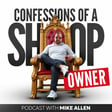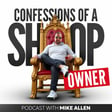
Ep 29 - Coaching Call #5 | Pizza Party For The Boyz
I only mention my sponsors because they have truly made a difference at my shops. I believe they can do the same for you. Visit their site below and learn more!
Today, it's coaching call number 5. This one is a bit different than the previous four, though. Why? I actually did my job! The strategy Matt and I have been working on is working well for my small shop, but it's not time to stop and celebrate. There is more work to be done. These conversations are a glimpse into what Elite Worldwide does for shops everywhere. Do you have them helping you?
00:00 Matt is bouche
08:19 Efficient Vehicle Maintenance Integration
11:10 Boosting Adoption of BG Services and Tires
19:19 "Managing Warranty Comebacks Efficiently"
25:52 Warranty Impacts on Free Labor
30:38 "Technician Pay Structure Adjustments"
33:58 Complex Repairs Undervalued in Labor Guides
43:23 Inexpensive Repair Causes Engine Failure
44:01 Ethical Sales and Repair Decisions
51:11 Customer Engagement & Service Strategy
58:04 Efficient Scheduling Boosts Car Count
01:00:50 Optimizing Consistent Car Count

